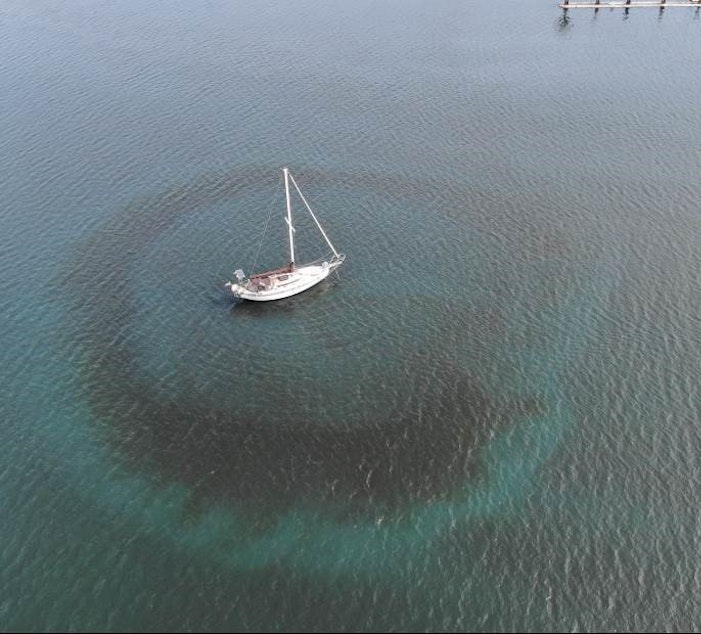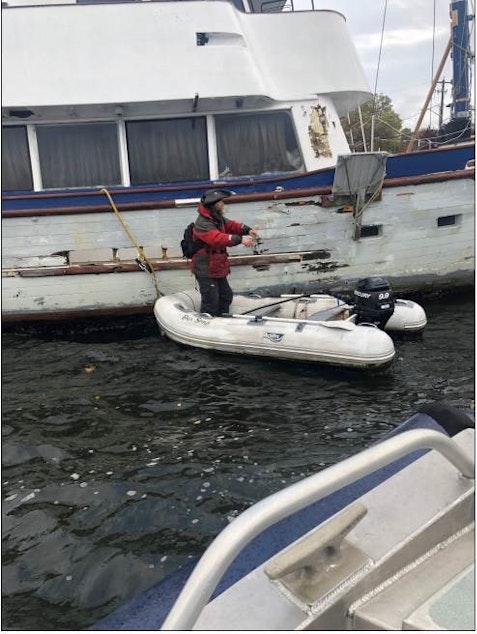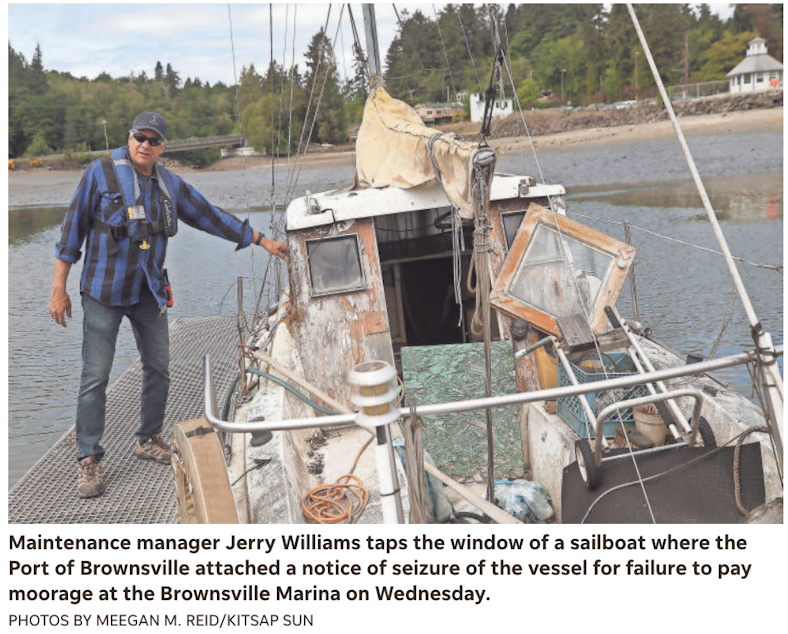Seattle Now: Ghost boats are haunting Puget Sound waters
It can cost over $10,000 to properly dispose of a boat that is no longer in working order. Some owners are choosing to abandon ship instead; causing big problems for marina managers and the environment.
Where do boats go to die? In Puget Sound, some boat owners with vessels they're no longer interested in maintaining are choosing to set their boats adrift instead of paying the thousands of dollars it takes to properly dispose of a boat.
In this episode of Seattle Now, producer Alec Cowan talks with Carol Tripp, executive director of the Port of Poulsbo, about how these abandoned "ghost ships" are causing problems in ports around Puget Sound. We'll also hear from Kitsap Sun reporter Josh Farley on what he's learned about how these ships are impacting the environment, and how our city's homelessness crisis may be fueling the rise in ghost boat sightings around the region.
The transcript below has been edited for clarity.
Sponsored

ALEC COWAN: If you go to one of the many, many marinas around Seattle and the Puget Sound region, you'll see many things. Personally, I love watching mariners sell crab fresh off the docks, and also reading silly and sometimes clever boat names. But if you walk the docks long enough, you'll start to see boats that, well, they don't really fit in.
CAROL TRIPP: It could be as bad as missing a mast. It could be, you know, when you just look at a boat you can tell if it has like the bottom paint is in really bad shape; if the engine's come in and it's just smoking or whatever.
Sponsored
ALEC COWAN: That's Carol Tripp. She's the accountant, treasurer and executive director at the Port of Poulsbo, over on the Kitsap Peninsula. She's talking about dealing with derelict boats, are what are also known by a more ominous name, "ghost boats."
CAROL TRIPP: There's just tell-tale signs; when you look at a vessel you can tell that it's going to ... it just kind of raises, you look at it and think you need to keep an eye on that one.
Environmental impact of ghost boats
Kitsap Sun reporter Josh Farley on the environmental risks of abandoned uncared-for boats on the water.
ALEC COWAN: Over the last year, Carol has seen an increase in the number of ghost boats staying at the Port of Poulsbo. Sometimes these are boats that are left anchored and abandoned off the coast. Other times, they're left stuck in marinas across the Puget Sound.
CAROL TRIPP: This is a perfect example that happened earlier this year. Somebody went on to Craigslist, they purchased a boat for $1. And you know that old adage "There is no such thing as a free boat?" It, for whatever reason, had some engine problems. They got a good samaritan that was out in the bay to help them bring it into the port in the evening. The next morning, we were out doing our rounds; we went ahead found this vessel that was moored here at the port. You know, fast forward two weeks later, we have contact with the owner but they're not responding to our replies. We have a boat that we've had to start pumping out now on a regular basis so that it doesn't sink — it's taking water on regularly.
Sponsored
So long story short, for this particular individual, the boat was in such bad condition, the person was not willing to take responsibility. They realized that yes, it was not a free boat. It was in worse shape than what they thought it was. So they ended up just walking away from the boat.
ALEC COWAN: Carol and the Port of Poulsbo aren't alone in this. While ghost boats can look on their face like a problem of neglect or even pollution, the increase in ghost boats is also a reflection of the region's homelessness crisis spilling onto the water.
To learn more I talked with Josh Farley, a reporter at the Kitsap Sun, about the specter of ghost boats with the marinas and government are doing to understand the problems these boats pose to the region and where those who own the boats and have to deal with them can go from here.
So Josh, you've had your eyes on this story for a while. But I'm first curious, what signaled to you that ghost boats were on the rise here in the region?
Sponsored
JOSH FARLEY: What I started noticing was when things would get stormy out on Puget Sound, the sound all around us ... you know, we're reporters, we listen to emergency radios and I started hearing more boats adrift; started hearing more calls for rescues. And (I) thought it was just kind of odd. So I thought to ask a few of our just our local marinas, and came to find out that we indeed have a lot more people that are boating on the water — even in the middle of winter —and not all of them are experienced mariners, shall we say (laughs).
ALEC COWAN: And you mentioned that these were called ghost boats. And I wonder, is that a nautical term? Where does that come from?
JOSH FARLEY: Yeah, a ghost boat, you know, probably goes by a few definitions. This was a term that was just kind of thrown about by mostly the experienced mariners that deal with such vessels. And the basic terminology there is this is a vessel that's unlicensed; chances are somebody found it on maybe Craigslist for $1 or $10, something very cheap, and then it's in the water but it has it has no licensing. Chances are it has no insurance. And so it really doesn't register necessarily back, or at least it registers back to previous owners that took took care of the vessel.

ALEC COWAN: And so when people are getting rid of these boats for, you're saying $1 or $10, I mean, what's the point of that? Is that strictly just so owners can just find a cheap way out of owning a boat?
Sponsored
JOSH FARLEY: Right, yeah. I've heard the expression a lot that, you know, the two happiest days of a boaters life are the day you buy the boat and the day you sell it. And so yeah, I do think there are people that it's sometimes it's hard to offload a vessel, a boat. And, and so in this way, it's an easy change. You know, maybe there's dire financial circumstances, who knows, they just can't afford to maintain a boat and it goes to someone else.
Sponsored
Meanwhile, we're facing probably the most severe housing shortage and housing crisis in our region, and so you have a lot of people that are looking for somewhere cheap to live. And so this may be one of those solutions for for people to get a roof over their heads.
Unfortunately, it's also some thing that is very dangerous if you don't know what you're doing.
ALEC COWAN: Yeah. And say more about that. What are the dangers of this?
JOSH FARLEY: Well, the the danger is particularly on those days that are stormy. So the where I'm learning a lot of my information from was a guy named Eric Hanson that runs a marine towing operation. And so on those days when I would hear on the emergency scanner, I hear calls for boats adrift. If you're on calm seas, if you're on a sailboat or some kind of power vessel, it's probably fine. But when things kick up, people can get kicked into the water real fast; the boat can capsize. And again, we're dealing with with cold waters of Puget Sound; it's just not a good situation.

Sponsored
ALEC COWAN: It sounds like these boats are old, they're heavily used; not in perfect working order. I wonder too, if selling these boats at such a low price is to avoid getting rid of them in a way they're probably supposed to be. There's something like a boat junkyard that these boats are preferred to go to, when they're out of their usable life?
JOSH FARLEY: There is a boat junkyard. And in fact, the state of Washington has a program for derelict vessels that they work hard on to take in vessels, particularly before they hit the water. So if you're able to get rid of a vessel before it gets into the water, that's a much cheaper prospect than once it's in Puget Sound. Once it's in Puget Sound, you're looking at no less than $10,000 in terms of the disposal. Let's say it needs environmental remediation, you're looking at huge costs; it's just going to go up from there. And if it sinks, you can multiply those costs by a lot. We're talking hundreds of thousands of dollars to dredge it up and then take it take it somewhere to be disposed of.
ALEC COWAN: Which makes the idea of selling it for $1 that much more attractive, I guess.
JOSH FARLEY: Exactly. Exactly.
ALEC COWAN: So for harbor masters and port authorities, when these boats are left anchored offshore or in their harbor, does that then mean that the costs of those boats — of decommissioning of any disasters — is then offloaded onto the harbors?
JOSH FARLEY: Yeah, that is part of the issue is that if it can be shown that they are now in possession of the vessel, that they are now bearing some of those costs. The state has a program for for this disposal, that they'll pay a majority, a great majority, of the percentage of those costs — if they apply for the for the program.

The issue on the state's end, at least earlier this year was they were out of money to do vessel disposal up until July 1. So we're past July now, of course. And so they can once again do some of those disposals, and they have a budget for that. But for a while there, there wasn't there wasn't anything. And you're right — port authorities, marinas, when they take on that kind of liability, one situation that I found with some vessels was it's just kind of a passing of the buck around. A police sergeant in Port Orchard found himself calling literally, you know, 10, 15 different agencies and all kind of pointed the finger around, saying, "We will report this, we will document it. But we're not doing anything more than that, given the extreme sort of the financial costs involved."
ALEC COWN: So then what our harbormaster is doing in that case, I mean, are they doing anything to keep these boats from arriving in the harbors or they chasing down owners as much as possible so they can avoid having to front those costs?
JOSH FARLEY: If they can't avoid it, they they do. They have established funds within their own budgets; they have to budget for this essentially, way more than they ever have before. And they do, they have to put money away — whether the state reimburses them or not. If boats are left behind — the other thing that happens, you know, and this is just a sad reality — is sometimes people who live on board vessels, who are paying customers of the marina, maybe they pass away, maybe of natural causes, on the boat. Well, they still now have a boat that they have to they have to find a future for, so that certainly happens.
I know I talked with the Port of Poulsbo about this specifically, and they just budget for it. And for them, the financial reality of having a budget for that means it comes down to dollars and cents. And that means maybe there are improvements that will that the at the docks at the marinas that they operate, that maybe just don't happen for a little while longer because they're having to deal with an increasing number of these derelict vessels.
The Phucket dilemma
KUOW producer Alec Cowan talks with Kitsap Sun reporter Josh Farley about a certain "ghost boat" on Puget Sound with a tricky name for public radio.
ALEC COWAN: So why is this an issue right now? And is that problem of these derelict vessels, is that changing as our region changes?
JOSH FARLEY: Yeah, definitely everyone I talked to, harbor masters, police, fire, and other responders all said that "Derelict vessels are something that we live with ... on the shores of the Salish sea, there's certainly lots of people who like to boat and are out on the water a lot."
I think the the change has really been that when you have all these vessels during a time where so many people are looking for a place to live, it's kind of like, one port manager said, "It's like an RV, except, you know, when you're on land, the RV doesn't sink." You're taking a risk, and to be honest, many of the rescue operators that go out there and make their living towing vessels, (say that) most of the time those are paying customers; they have insurance. But when they go out there, they actually have been quite impressed by some of these makeshift mariners —whatever you want to call them— that have just gone out there and wanted to learn very, very quickly how to how to live and how to survive.
It's not legal to stay in the state's aquatic lands, but technically speaking, if you keep kind of moving, if you keep going, you can make a go of it. Of course you might need fuel — if you're sailing not necessarily — but you can make a living on the cheap to do this. The question is whether they have the experience to make sure that essentially, they are not taking too great of a risk in going out on what can be choppy and stormy waters out on Puget Sound.

ALEC COWAN: That was Josh Farley, reporter for the Kitsap Sun. And on a final note today, marinas don't have a surefire way to prevent or deal with derelict boats. And when talking with Carol Tripp from the Port of Poulsbo, she wanted to reaffirm that she understands this is a life choice for many. Living on your boat isn't a bad thing, so long as you're willing to take up the responsibility for it.
CAROL TRIPP: Not every boat that is anchored out is a problem boat. Because we have folks that are, for example, out here that are in Liberty Bay. They come into town, they go do their shopping, whatever. They're anchored out for a you know, a week or two, they stay out, they do their thing. And then they go off to their next destination. And that's fine. I think that's great. That's your life choice, the lifestyle you want to have —that's great.
But it's the folks that come and they want to anchor out for a month or two. They leave their boat, they park it out there. They don't take care of it. You end up having oil spills, vessels aren't monitored, their bilges are dirty. When their bilge pumps come on, then you end up having oil sheets, and that's where I have an issue. If you look at our breakwater, you'll see seals, their pups, the whole thing out there. We can't be having that kind of thing.
This episode of Seattle Now was produced by Alec Cowan and hosted by Paige Browning. This web story was produced by Kristin Leong.
Want more Seattle Now? Follow us on Instagram @seattlenowpod, or send us a note at seattlenow@kuow.org.
Have you noticed ghost boats during your Puget Sound adventures this summer? Do you have ideas for what to do about these abandoned vessels? Send our producer a message at acowan@kuow.org, tweet at him @PodcastAlec, or just head over to the side of this page and click the feedback button. We're listening.






